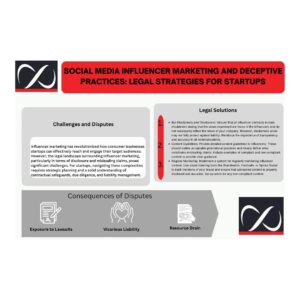
Influencer marketing has revolutionized how consumer businesses startups can effectively reach and engage their target audiences. However, the legal landscape surrounding influencer marketing, particularly in terms of disclosure and misleading claims, poses significant challenges. For startups, navigating these complexities requires strategic planning and a solid understanding of contractual safeguards, due diligence, and liability management. This blog addresses three critical questions to help startups protect themselves from legal repercussions in influencer marketing.
Question 1: Contractual Safeguards – Specific Clauses for Protection
Challenges: When influencers fail to disclose sponsored content or make misleading claims, startups can face serious legal consequences. Including specific clauses in influencer contracts is essential to mitigate these risks.
Solutions:
- Disclosure Requirements: Include explicit clauses that mandate compliance with the Advertising Standards Council of India (ASCI) guidelines. These clauses should require influencers to clearly disclose any sponsored content using appropriate hashtags (e.g., #ad, #sponsored). Specify the exact language or tags to be used and where they should appear in posts.
- Accuracy of Claims: Add clauses that strictly prohibit false or exaggerated claims about your products. Define what constitutes misleading claims and provide examples to ensure clarity. For instance, state that influencers cannot make health or performance claims that are not substantiated by evidence.
- Indemnity Clauses: Incorporate indemnity clauses that hold influencers financially responsible for any legal issues arising from their non-compliance. This shifts liability away from the startup and serves as a deterrent against making false claims. Clearly outline the scope of indemnity, including legal fees and damages.
- Payment Withholding: Specify conditions under which payments can be withheld. For instance, if an influencer fails to disclose a sponsorship or makes misleading claims, you should have the right to withhold payment until the issue is rectified. Outline the process for resolving disputes related to non-compliance.
- Termination Clauses: Include clauses that allow for contract termination in cases of repeated non-compliance. This provides a clear exit strategy if an influencer fails to adhere to your guidelines. Detail the circumstances under which immediate termination is warranted and the consequences of such actions.
- Content Approval: Establish a mandatory content approval process. Require influencers to submit their content for review before posting, allowing you to catch any potential issues beforehand. Set reasonable timelines for the approval process to avoid delays in campaign execution.
Question 2: Due Diligence and Compliance – Ensuring Adherence to ASCI Guidelines
Challenges: Ensuring influencers, particularly micro-influencers, comply with ASCI guidelines can be challenging, especially when they might not be fully aware of these regulations.
Solutions:
- Influencer Vetting: Implement a rigorous vetting process using influencer marketing platforms such as AspireIQ, Upfluence, or Influencity. These platforms provide insights into an influencer’s past compliance with disclosure norms and overall credibility. Review their previous collaborations and assess their engagement rates, audience demographics, and sentiment analysis.
- Educational Workshops: Conduct cost-effective online workshops and webinars to educate influencers about ASCI guidelines. Engage legal experts to explain the importance of compliance and the potential repercussions of non-compliance. Offer certificates of completion to incentivize participation and ensure influencers take the training seriously.
- Educational Materials: Create and distribute concise educational materials like infographics, checklists, and videos. These should outline key ASCI guidelines and best practices for sponsored content disclosure. Make these resources easily accessible through a dedicated influencer portal or via email.
- Regular Communication: Send out periodic newsletters and updates to keep influencers informed about any changes in ASCI regulations and reinforce the importance of compliance. Use email automation tools to streamline this process and ensure consistent communication. Include case studies of both compliant and non-compliant practices to illustrate the real-world implications.
- Incentives for Compliance: Establish a reward system to encourage adherence to guidelines. This could include bonuses, higher pay rates, or priority selection for future campaigns for influencers who consistently follow the rules. Create a tiered reward structure based on the level of compliance and performance metrics.
- Peer Support: Foster a community of influencers where they can share experiences and tips on maintaining compliance. Peer learning can be an effective and cost-efficient way to disseminate best practices. Organize regular virtual meetups or forums where influencers can discuss challenges and solutions.
Question 3: Limited Control and Vicarious Liability – Managing Legal Risks
Challenges: Startups often have limited control over the content produced by influencers, which can lead to concerns about vicarious liability for misleading content, even when contracts include disclaimers.
Solutions:
- Disclaimers and Disclosures: Ensure that all influencer contracts include disclaimers stating that the views expressed are those of the influencers and do not necessarily reflect the views of your company. However, disclaimers alone may not fully protect against liability. Reinforce the importance of transparency and accuracy in all communications.
- Content Guidelines: Provide detailed content guidelines to influencers. These should outline acceptable promotional practices and clearly define what constitutes misleading claims. Include examples of compliant and non-compliant content to provide clear guidance.
- Regular Monitoring: Implement a system for regularly monitoring influencer content. Use social listening tools like Brandwatch, Hootsuite, or Sprout Social to track mentions of your brand and ensure that sponsored content is properly disclosed and accurate. Set up alerts for any non-compliant content.
- Prompt Action: Take immediate corrective action if an influencer posts misleading content. This could include requesting a correction, issuing a public statement, or terminating the partnership. Document all actions taken to address non-compliance to protect your brand in case of legal scrutiny.
- Contractual Protections: Include robust indemnity and termination clauses in your contracts to limit your liability. Indemnity clauses should hold influencers accountable for any legal repercussions resulting from their non-compliance. Specify the process for handling disputes and the steps required for remediation.
- Training Programs: Provide ongoing training for influencers on regulatory compliance. Ensure they understand the importance of adhering to ASCI guidelines and the potential legal consequences of non-compliance. Offer refresher courses periodically to keep influencers updated on any changes in regulations.
- Legal Consultation: Consult with legal experts to ensure your contracts and practices are up to date with the latest regulations. This proactive approach can help identify and mitigate potential risks before they become issues. Consider periodic legal audits of your influencer marketing strategy to ensure ongoing compliance.
Conclusion
Navigating the legal complexities of social media influencer marketing can be particularly challenging for startups. However, by implementing strategic contractual safeguards, rigorous due diligence measures, and proactive liability management practices, startups can effectively protect themselves from legal repercussions.
Contractual Safeguards: Detailed contracts with specific clauses for disclosure, accuracy of claims, indemnity, payment withholding, and termination provide a strong foundation for protecting your startup.
Due Diligence and Compliance: Educating influencers and ensuring their compliance with ASCI guidelines through workshops, educational materials, and regular communication can prevent legal issues and foster a trustworthy influencer network.
Limited Control and Vicarious Liability: While startups may have limited control over influencer content, establishing clear guidelines, regular monitoring, and prompt corrective actions can significantly reduce the risk of vicarious liability.
In conclusion, although the path to compliant and effective influencer marketing can be complex, strategic planning and the right tools can make it manageable even for startups with limited resources. By diligently screening influencers, educating them on compliance, and protecting your startup through robust contracts and proactive measures, you can confidently leverage the power of influencer marketing while adhering to ethical and legal standards.









